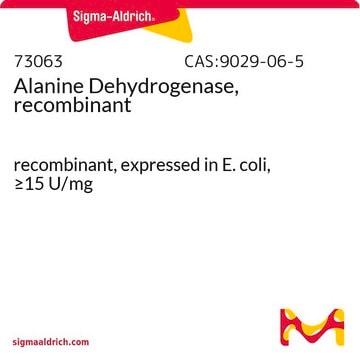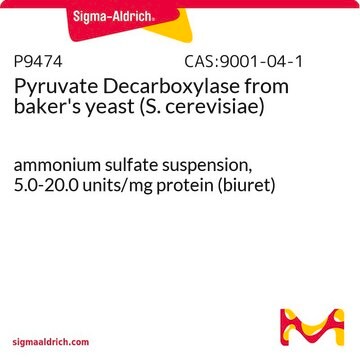A7653
L-Alanine Dehydrogenase from Bacillus subtilis
buffered aqueous glycerol solution, ~30 units/mg protein (Lowry)
Synonym(s):
L-Alanine: NAD+ oxidoreductase (deaminating)
Sign Into View Organizational & Contract Pricing
All Photos(1)
About This Item
Recommended Products
biological source
Bacillus subtilis
Quality Level
form
buffered aqueous glycerol solution
specific activity
~30 units/mg protein (Lowry)
foreign activity
LDH ~1% (using pyruvate as substrate)
storage temp.
−20°C
Looking for similar products? Visit Product Comparison Guide
Application
L-Alanine dehydrogenase converts L-alanine to pyruvate and ammonium. L-Alanine dehydrogenase from Bacillus subtilis may be used to study enzyme inactivation and protection .
Biochem/physiol Actions
L-Alanine dehydrogenase is an A-stereospecific dehydrogenase that catalyzes the reversible deamination of L-alanine to pyruvate and ammonium. It is important for the generation of pyruvate during sporulation. L-Alanine dehydrogenase from Bacillus subtilis has a predominately ordered kinetic mechanism in which NAD binds before L-alanine. Subsequently, ammonia, pyruvate, and NADH are released in that specific order. Optimal pH for the amination reaction is 8.8-9.0, whereas it is 10-10.5 for the deamination reaction. The enzyme is inactivated by divalent metal ions and p-chloromercuribenzoate, mercuric ion being most effective. The inactivation may be reversed by L- or D-cysteine.
Unit Definition
One unit will convert 1.0 μmole of L-alanine to pyruvate and NH3 per min at pH 10.0 at 25 °C.
Physical form
Solution in 50% glycerol containing 10 mM potassium phosphate buffer, pH 7.7
Signal Word
Danger
Hazard Statements
Precautionary Statements
Hazard Classifications
Resp. Sens. 1
Storage Class Code
10 - Combustible liquids
WGK
WGK 3
Personal Protective Equipment
dust mask type N95 (US), Eyeshields, Gloves
Choose from one of the most recent versions:
Certificates of Analysis (COA)
Lot/Batch Number
Don't see the Right Version?
If you require a particular version, you can look up a specific certificate by the Lot or Batch number.
Already Own This Product?
Find documentation for the products that you have recently purchased in the Document Library.
D Delforge et al.
The Journal of biological chemistry, 272(4), 2276-2284 (1997-01-24)
L-Alanine dehydrogenase from Bacillus subtilis was inactivated with two different lysine-directed chemical reagents, i.e. 2,4, 6-trinitrobenzenesulfonic acid and N-succinimidyl 3-(2-pyridyldithio)propionate. In both cases, the inactivation followed pseudo first-order kinetics, with a 1:1 stoichiometric ratio between the reagent and the enzyme
Hexigeduleng Bao et al.
Plant, cell & environment, 38(3), 600-613 (2014-07-31)
γ-Aminobutyric acid (GABA) accumulates in many plant species in response to environmental stress. However, the physiological function of GABA or its metabolic pathway (GABA shunt) in plants remains largely unclear. Here, the genes, including glutamate decarboxylases (SlGADs), GABA transaminases (SlGABA-Ts) and
Wei Ye et al.
Microbiological research, 165(4), 268-275 (2009-09-02)
The major objective of the present study is to change the alanine production of Lactic acid bacteria by expression of Bacillus subtilis (natto) alanine dehydrogenase (AlaDH), the gene that is not present in Lactic acid. B. subtilis AlaDH gene (ald)
Gabriella M Scandurra et al.
Microbiology and immunology, 50(10), 805-810 (2006-10-21)
The tuberculosis (TB) vaccine strain Mycobacterium bovis BCG is unable to utilise alanine and this deficiency is thought to inhibit the growth of the vaccine in vivo and limit vaccine efficacy. In this report we demonstrate that L-alanine catabolism can
Karin Denger et al.
Microbiology (Reading, England), 152(Pt 11), 3197-3206 (2006-11-01)
A degradative pathway for taurine (2-aminoethanesulfonate) in Rhodobacter sphaeroides 2.4.1 was proposed by Brüggemann et al. (2004) (Microbiology 150, 805-816) on the basis of a partial genome sequence. In the present study, R. sphaeroides 2.4.1 was found to grow exponentially
Our team of scientists has experience in all areas of research including Life Science, Material Science, Chemical Synthesis, Chromatography, Analytical and many others.
Contact Technical Service








